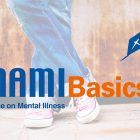NAMI Basics Course 2020
Free Online Course for Families, Caregivers of Children, Young People With Mental Health Conditions
|
A free online educational course for parents and family caregivers of children and young adults aged 21 or younger will soon be offered by the Southwest Connecticut Chapter of the National Alliance on Mental Illness. — an announcement from NAMI Southwest CT
The six-session course starts Oct. 8 and is open to those helping care for children and adults, ages 21 or younger who are experiencing symptoms of a mental health condition or who have already been diagnosed. The NAMI Basics course will be held on Thursday mornings, from 9 to 11:45 a.m., beginning Thursday Oct. 8, 2020.




